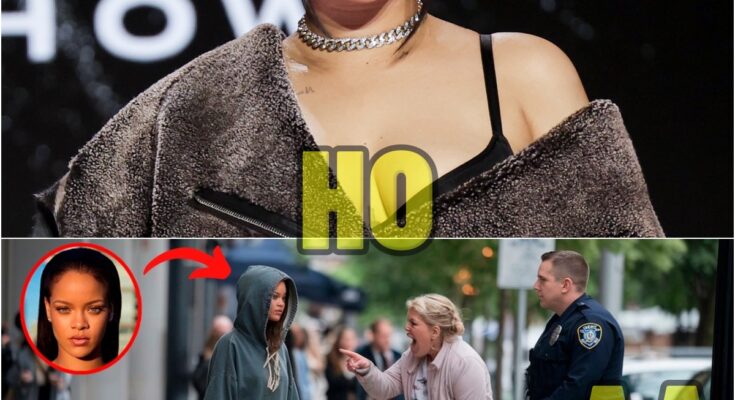In a bold and thought-provoking social experiment, global music icon Rihanna decided to disguise herself as a street musician, taking on a role that would strip her of the glamor and adoration she’s used to. This was not just any musical performance; it was a daring attempt to uncover society’s hidden biases and reveal how people treat those they perceive as less fortunate or invisible. Little did she know, what started as a quiet test would spiral into an emotional, heart-wrenching series of events that would not only challenge her expectations but also expose the deep-seated systemic injustices in society.
The city, as usual, was alive with its usual symphony of chaos. Horns honked in frustration as cars battled for dominance on congested streets, while pedestrians rushed along the sidewalks, each person seemingly a tiny cog in the ever-turning machine of city life. Amid this bustling world of constant movement, Rihanna found herself standing at the entrance of a dimly lit underpass. It was a stark contrast to the noisy streets above, offering a space of quiet anonymity — perfect for her experiment.
Her appearance was meticulously crafted to blend in with the environment. Gone was the superstar look — no flashy outfits, no designer heels. Instead, she wore an oversized coat that hung loosely around her frame, the edges frayed from imaginary wear. Her hair was hidden beneath a knitted beanie that had clearly seen better days. Subtle makeup added faint lines of exhaustion to her face, completing the illusion of someone who had been forgotten by the world.
She stepped forward into the underpass, gripping her battered guitar case tightly. As she made her way to a spot in the dimly lit area, her boots scuffing against the cracked concrete, she felt the weight of the moment. This wasn’t just about playing music; this was about confronting the harsh realities of society — a society that often ignores or dismisses those it perceives as less important.
Rihanna took her seat in the underpass, the cold from the concrete seeping into her legs. Carefully, she unlatched the guitar case, revealing an old acoustic guitar that had seen better days, but was still functional. She also had a small stack of handwritten lyrics and a tin cup, the makeshift tool she would use to collect any spare change that might come her way. She tuned the guitar carefully, each string adjustment grounding her, steadying her nerves. As she looked around, she noted how people hurried past her, most too busy to acknowledge her presence.

The first note she played was soft, almost timid, but it carried an undercurrent of determination. She began singing a song about hope and survival, a melody that carried an unspoken plea for connection — a plea for someone to notice her. At first, no one stopped. People walked past without so much as a glance. A businessman in a tailored suit took a fleeting glance at her, but quickly turned his eyes away, as if he had somewhere far more important to be. A mother with a stroller shifted slightly to avoid getting too close to her, as if proximity itself could be contagious.
Rihanna’s heart sank, but she pressed on, letting the rhythm of the music carry her through the rejection. After a few minutes, a young couple stopped a few feet away. The man, tall with sharp features and an air of disdain, glanced at her briefly. “Another one of these street performers,” he muttered loud enough for her to hear. His partner, a petite woman with a nervous smile, clung to his arm, as if seeking reassurance. They didn’t want to be associated with her. “Come on, let’s go,” the woman whispered, tugging her partner away.
As they walked off, Rihanna’s frustration began to build. Anger, sadness, and a sense of helplessness swirled inside her. But instead of letting those emotions overwhelm her, she played on, letting the music serve as an outlet for the pain she was feeling. Her fingers moved faster, the tempo of the song rising in response to the apathy around her.
Before long, a group of teenagers entered the underpass. Their voices bounced off the walls as they laughed and joked. One of the boys, a teenager with a backwards cap and a phone in hand, pointed at Rihanna and snickered, “Yo, check this out!” He called over to his friends, as if seeing a street performer was some kind of spectacle. One of them, a tall boy with swagger, crouched down in front of her, his face close to hers. “You any good?” he asked, mocking her.
Rihanna didn’t respond but instead played another chord, her fingers moving with precision. The boy, unimpressed, reached for the tin cup she had placed beside her and shook it, the coins inside jingling before he dumped them all on the ground. “Here,” he sneered, “thought you might want to count your fortune.” The group burst into laughter and walked off, leaving her to pick up the scattered coins.
This moment, this raw cruelty, stung Rihanna more than she had expected. It was one thing to anticipate the apathy, but another to experience it firsthand. Her hands trembled as she gathered the coins, her tears threatening to spill. But she refused to let the disrespect diminish her resolve. She straightened up, adjusted her beanie, and started playing again, her voice rising with newfound strength.
The crowd continued to ebb and flow, some people casting quick glances in her direction, while others ignored her altogether. A middle-aged man in a beige trench coat briefly looked at her before shaking his head in disapproval. A young woman, earbuds in place, passed by without acknowledging her. Despite the coldness, Rihanna pressed on, her voice unwavering, cutting through the indifference.
Then, the unmistakable sound of heavy boots echoed through the underpass. Rihanna looked up and saw a security guard walking toward her, his expression stern, his steps purposeful. He stopped in front of her, his arms crossed. “You can’t sit here,” he said flatly. “This is private property. You’re loitering.”
Rihanna’s heart skipped a beat, but she kept her composure. “I’m just playing music,” she replied calmly. “I’m not bothering anyone.”
The guard smirked, his eyes narrowing. “Not bothering anyone? Do you know how many complaints I’ve gotten today? People don’t come here to watch a charity case put on a show.”
Her throat tightened, but she held her ground. “I’m not asking for charity,” she said. “I’m just sharing music.”
“Save it,” the guard snapped, dismissing her with a wave of his hand. “Pick up your stuff and move along, or I’ll have to call the cops.”
Rihanna hesitated, then stood her ground. “I’m not breaking any laws,” she replied. “This is a public space.”
The guard’s expression hardened. “Listen, lady, I don’t have time to argue. You either pack it up, or I’ll pack it up for you.”
The tension was palpable, and Rihanna felt the weight of every eye on her. The bystanders refused to get involved, their eyes casting away in avoidance. With a deep breath, Rihanna spoke again, her voice quieter but more defiant. “I’m not leaving,” she said firmly. “You can call the police if you want.”
A few minutes later, the sirens of a police cruiser echoed in the distance, growing louder by the second. The officers arrived and were briefed by the security guard, who gestured toward Rihanna. The officers approached, their presence authoritative and intimidating. “Ma’am, you can’t sit here and cause a disturbance,” one of them said.
“I’m not causing a disturbance,” Rihanna replied. “I’m playing music. That’s not against the law.”
The officers exchanged glances, then one of them reached for her arm, pulling her to her feet. The other grabbed her guitar, tossing it to the ground, snapping a string as it hit the concrete. Rihanna protested, but the officers were unmoved. The scene was captured on video by a teenager in the crowd, eager to share the spectacle online.
In the police car, as they drove her to the station, Rihanna stared out the window, her mind racing. The experiment had taken a dark turn, but she knew that this was the reality she had come here to expose. The truth, raw and uncomfortable, was now undeniable.
At the station, the sergeant barely glanced at her as she was brought in. Her disheveled appearance, the broken guitar, and the coldness of the officers all served as a testament to the harsh realities faced by those society chooses to ignore. Rihanna had set out to test society’s empathy — what she had uncovered was far more troubling. The silence of the crowd, the apathy of those in power, and the cruelty of strangers had shown her the very depths of systemic injustice.
But through it all, Rihanna’s spirit remained unbroken. She had come to uncover the truth, and now, she had the evidence to prove it.




